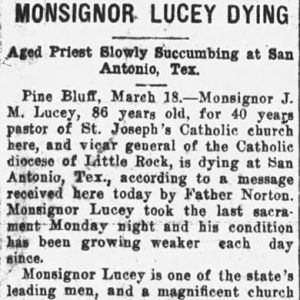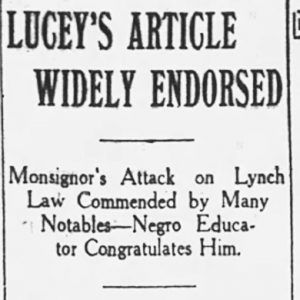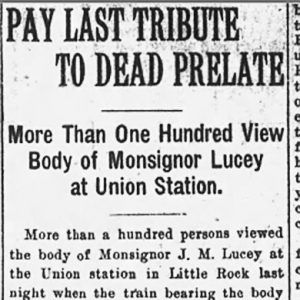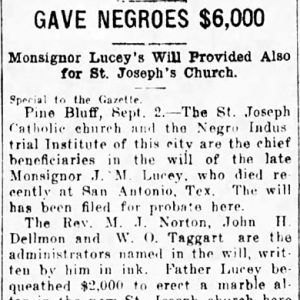calsfoundation@cals.org
John Michael Lucey (1843–1914)
John Michael Lucey was an Irish Catholic former Confederate soldier who became a priest after the Civil War and took an interest in civil rights for African Americans. Speaking out against lynching and separate-coach laws and establishing the Colored Industrial Institute in Pine Bluff (Jefferson County), Lucey was a progressive voice for African Americans in Arkansas. Lucey also promoted Arkansas as a home for Catholic immigrants, which made him a target of anti-Catholic sentiment.
John Michael Lucey was born on September 29, 1843, in Troy, New York, to John and Brigid Lucey, both Irish immigrants. The Luceys also had two daughters and had lost another son in infancy. While living in Troy, the Luceys heard from a priest about an Irish colony at Rocky Comfort, Arkansas—present-day Foreman (Little River County). The Luceys settled in Rocky Comfort in 1847. After three years, they moved to Fort Smith (Sebastian County), where John Michael Lucey studied at St. Andrew’s and Ward Academy. He was prone to illness, suffering from pulmonary consumption (more commonly called tuberculosis).
Illness did not stop Lucey from serving with the Fort Smith Rifles, Company A, Third Regiment, Arkansas State Troops during the Civil War alongside future Arkansas governor Daniel Webster Jones. Lucey was commended for bravery at the Battle of Wilson’s Creek. Later in the war, he was transferred to the Quartermaster’s Department (possibly Company C, Seventeenth Arkansas Infantry). There were also claims that he served as an irregular soldier, as his ill health would not allow a surgeon to qualify him as fit for service. At this time, Lucey suffered from throat problems, an onset of deafness, and lung weakness—possibly resulting from the pulmonary consumption. The surgeon, a Dr. Spring, did not think Lucey would make it six months in the war, let alone see the age of twenty-one. Lucey was taken prisoner and paroled in 1864.
After the war, Lucey entered Fordham University in New York and then attended Mount Saint Mary’s Theological Seminary in Cincinnati, Ohio. Ill health and the hearing loss suffered during the war forced him out of the seminary in 1870. Moving back to Fort Smith, Lucey began teaching, hoping to become a priest one day. Within a few years, his hearing was restored, and he was able to finish his studies for the priesthood under Bishop of Little Rock Edward Fitzgerald.
On November 14, 1872, Lucey was ordained a priest at Fort Smith’s Immaculate Conception Church. His first parish assignment one month later was at St. Joseph’s in Pine Bluff, where he also served other Catholics in southeastern Arkansas, including New Gascony (Jefferson County), Arkansas City (Desha County), and Monticello (Drew County). Lucey was involved in several civic endeavors, including the formation of the first Arkansas chapter of the United Confederate Veterans; he served as its assistant chaplain. He would later form a committee to raise money for a monument to Arkansas’s Confederate women. He also served on committees to promote the businesses of Arkansas, especially Pine Bluff, and encouraged Catholic settlement in the state.
Lucey was considered progressive for his views toward African Americans. After the Civil War, Lucey noticed a drop in the number of African-American Catholics in Arkansas; he estimated that only 400 were in Arkansas by 1890. There was no separate parish at that time in Pine Bluff for African-American Catholics, but Lucey held a separate mass in the afternoons at St. Joseph’s Church. Lucey believed that establishing a school for African Americans under the banner of the Diocese of Little Rock would be an effective method of evangelization to the African-American community. The school would have the support of the Diocese of Little Rock but would not be a parochial school, in that it was not affiliated with a particular religious order or a particular parish. Planning and fundraising began in spring 1889, and the Colored Industrial Institute opened in the fall.
Less than a year after the school opened, Arkansas legislators were considering separate-coach legislation, requiring separate coaches on railway trains for white and black passengers. Lucey spoke out against such legislation, writing letters that were printed in the Little Rock (Pulaski County) papers. This drew negative attention, with some people saying that Lucey should have stopped his support of African Americans with the school. Lucey also spoke out about lynching on the basis that it represented the lawless taking of human life, moved justice from the courts, and caused a breakdown of law and order. He wrote and actively promoted legislation that became Act 258 of 1909.
Lucey was appointed monsignor in 1903. In 1907, Bishop John Baptist Morris made him vicar general of the Diocese of Little Rock. Lucey wrote some of the earliest histories of the Catholic Church in Arkansas. He served as the first editor of the Southern Guardian (what is now the Arkansas Catholic) newspaper until declining health led him to resign after six months and return to his duties as pastor of St. Joseph’s.
His health continued declining, and while undergoing treatment in San Antonio, Texas, Lucey died on June 20, 1914. After a funeral at St. Joseph’s in Pine Bluff, he was interred with his family in Fort Smith.
For additional information:
Lucey, Rev. James M. The Catholic Church in Arkansas. Little Rock: Little Rock Board of Trade, 1906.
Lucey. J. M. “History of Immigration in Arkansas.” Publications of the Arkansas Historical Association, Vol. 3, 1911: 201–219.
Woods, James M. Mission and Memory: A History of the Catholic Church in Arkansas. Little Rock: Diocese of Little Rock, 1993.
Amanda L. Paige
Little Rock, Arkansas










Comments
No comments on this entry yet.